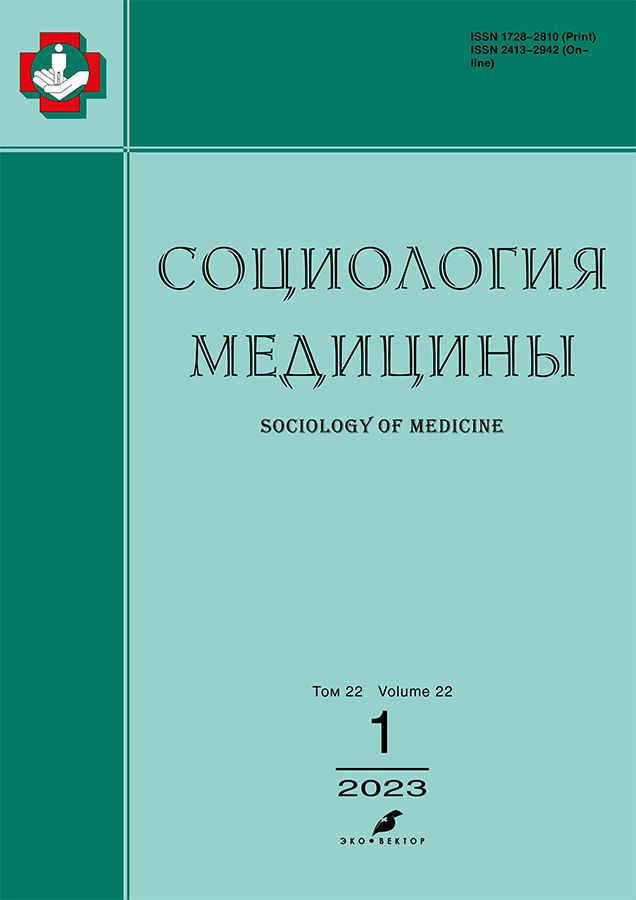Requirements for digitalization of optimization technologies in healthcare: sociological research
- Authors: Korshever N.G.1, Pomoshnikov S.N.1, Royuk V.V.2
-
Affiliations:
- Saratov State Medical University named after V.I. Razumovsky
- Sechenov First Moscow State Medical University (Sechenov University)
- Issue: Vol 22, No 1 (2023)
- Pages: 51-58
- Section: THE DIGITAL WORLD
- URL: https://rjsocmed.com/1728-2810/article/view/159393
- DOI: https://doi.org/10.17816/socm159393
- ID: 159393
Cite item
Abstract
BACKGROUND: The relevance of the study is due to the insufficient study of the requirements for digitalization in healthcare.
AIM: The aim of this research is the scientific substantiation of requirements for digitalization of optimization technologies in healthcare, and their approbation on the model of management decision-making in medical institutions.
MATERIALS AND METHODS: An anonymous survey involved 32 teaching experts from organizational departments and the Department of Philosophy, Humanities and Psychology of Saratov State Medical University named after V.I. Razumovsky, where optimization technologies have been rapidly developed and introduced into teaching and practice. Experts were asked to use a 10-point scale to evaluate the list of requirements for digitalization of optimization technologies in healthcare, and their significance. As the data distribution did not correspond to the binomial Gauss–Newton curve, the assessment of the reliability of differences was performed using the nonparametric Mann–Whitney criterion.
RESULTS: A list of seven requirements for the digitalization of optimization technologies in healthcare, relevant to information support, automated evaluation of the initial state, implementation of the provisions of flexible changes methodology, virtualization of the optimization goal, cyclic optimization process, unified information space, organization of professional training was designed. Since the significance of all these requirements is essential (more than 8.0 points), we can suggest that when assessing the compliance of a particular technology, the entire list should be implemented. It turned productive to use the results of designing the technology for optimization of managerial decision-making in medical institutions for approbation of reasonable requirements.
CONCLUSION: The requirements for digitalization of optimization technology in healthcare have been substantiated. It has been proved that the technology of optimizing managerial decision-making in medical institutions is digitized. The findings of this study can be used in both assessing the degree of digitalization of optimization technologies in healthcare and the professional training of healthcare managers.
Full Text
About the authors
Natan G. Korshever
Saratov State Medical University named after V.I. Razumovsky
Author for correspondence.
Email: korshever@bk.ru
ORCID iD: 0000-0002-5545-6844
SPIN-code: 3665-2116
MD, Dr. Sci. (Med.), Professor
Russian Federation, SaratovSergei N. Pomoshnikov
Saratov State Medical University named after V.I. Razumovsky
Email: 400578@mail.ru
ORCID iD: 0000-0002-3268-3470
SPIN-code: 6887-9331
Graduate student
Russian Federation, SaratovValery V. Royuk
Sechenov First Moscow State Medical University (Sechenov University)
Email: vvroyuk@mail.ru
ORCID iD: 0000-0002-4966-3767
SPIN-code: 7535-4008
MD, Cand. Sci. (Med.), Assistant Professor
Russian Federation, MoscowReferences
- World Health Organization [Internet]. 2021 [cited 2023 Jan 23]. Global strategy on digital health 2020–2025. Available from: https://cdn.who.int/media/docs/default-source/documents/gs4dhdaa2a9f352b0445bafbc79ca799dce4d.pdf
- World Health Organization [Internet]. 2020 [cited 2023 Jan 23]. Digital health platform handbook: building a digital information infrastructure (infostructure) for health. Available from: https://apps.who.int/iris/bitstream/handle/10665/337449/9789240013728-eng.pdf
- Vlasova VN. Digitalization of the healthcare system in Russia: upcoming trends and risks. Medical Ethics. 2021;9(3):4–8. doi: 10.24075/medet.2021.021
- Selivanov DV. Digitalization of healthcare in Russia: problems and prospects. Vestnik Roszdravnadzora. 2020;(3):12–19. doi: 10.35576/2070-7940-2020-3-12-19
- Tikhonyuk NE, Gordeev AA. Evaluation of the digital transformation’s results in Russia by 2022. Ekonomika i predprinimatel'stvo. 2022;(4):119–123. doi: 10.34925/EIP.2022.141.4.020
- Yudin VI, Shirokova OV. Prospects and role of digital technologies in Russian healthcare reforming. Zdorov'e megapolisa. 2020;1(1):72–86. doi: 10.47619/2713-2617.zm.2020.v1i1;72-86
- Afanaseva EYu. Automation and digitalization of accounting: similarities and differences. Vestnik Polotskogo gosudarstvennogo universiteta. Seriya D. Ekonomicheskie i yuridicheskie nauki. 2021;(6):9–14. doi: 10.52928/2070-1632-2021-57-6-9-14
- Milkova EG. From automation to digitization — differences and trends. Colloquium-Journal. 2020;(9 Pt 6):15–19.
- Moskvicheva MG, Shchepilina ES. The possibility of using Google’s services for adoption of management decisions in organization of emergency medical aid. Medical Doctor and Information Technologies. 2018;(4):27–33.
- Moreno-Calderón A, Tong TS, Thokala P. Multi-criteria decision analysis software in healthcare priority setting: a systematic review. Pharmacoeconomics. 2020;38(3):269–283. doi: 10.1007/s40273-019-00863-9
- Mishin VM. Control systems research. Moscow: YuNITI-DANA; 2005. (In Russ).
- Reshetnikov VA, Korshever NG, Royuk VV, Sidelnikov SA. Sectors involved in public health in the Russian Federation during COVID-19 pandemic. Problems of Social Hygiene, Public Health and History of Medicine. 2022;30(5):713–718. doi: 10.32687/0869-866X-2022-30-5-713-718
- Korshever NG, Pomoshnikov SN. Management decision-making in medical organizations. Saratov: Izdatel'stvo Saratovskogo gosudarstvennogo meditsinskogo universiteta; 2020. (In Russ).
- Maslovsky VP, Ozerova AA. Theoretical premises and the principles of flexible methods of projects management. Socio-Economic and Humanitarian Journal. 2020;(1):68–83. doi: 10.36718/2500-1825-2020-1-68-83
- Aksenova EI, Shkrumyak AR. Healthcare personnel in the context of the introduction of digital systems. Byulleten' natsional'nogo nauchno-issledovatel'skogo instituta obshchestvennogo zdorov'ya imeni N.A. Semashko. 2021;(4):130–137. doi: 10.25742/NRIPH.2021.04.018
- Mushnikov DL, Kozlov VA, Oleinik AV, Abrosimov EA, Kolobova TL. Medical-organizational, digital and socio-cultural technologies of working with patients: classification, quality. Medical and Pharmaceutical Journal Pulse. 2022;24(4):33–37. doi: 10.26787/nydha-2686-6838-2022-24-4-33-37
- Osadchaya SM, Osadchaya AN. Digital technologies in the management of a medical institution. Biznes. Obrazovanie. Pravo. 2022;(1):132–136. doi: 10.25683/VOLBI.2022.58.160
- Sertakova OV, Dzyuba NA, Sukhinina IV. Inter-firm cooperation and digital technologies: mutual determinants of the development of the quality of medical care and rehabilitation of the population. Economics and Society: Contemporary Models of Development. 2021;11(1):29–46. doi: 10.18334/ecsoc.11.1.111621
Supplementary files







